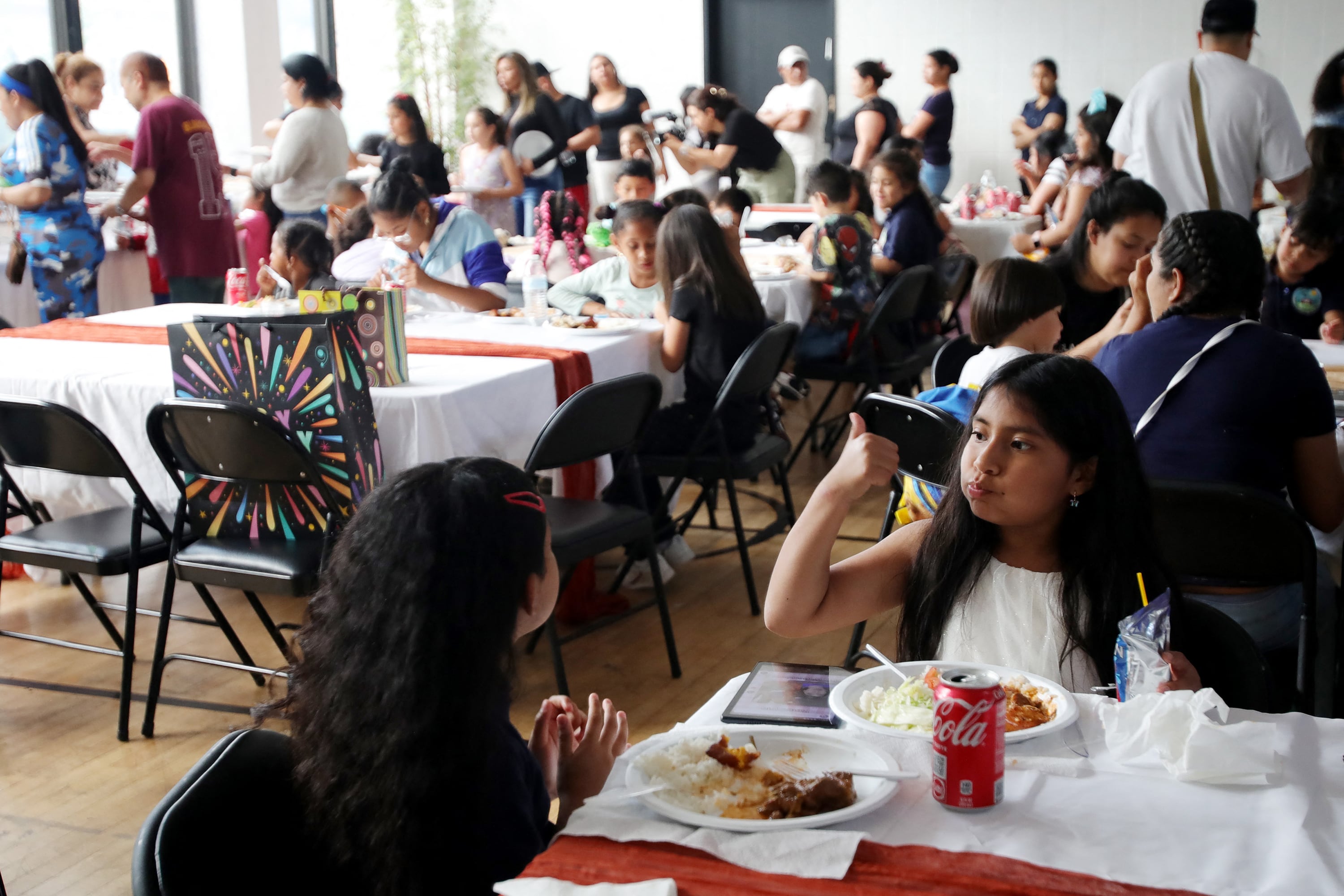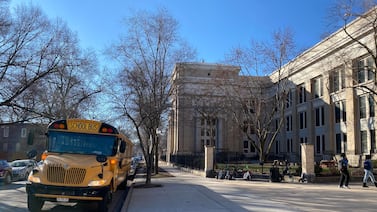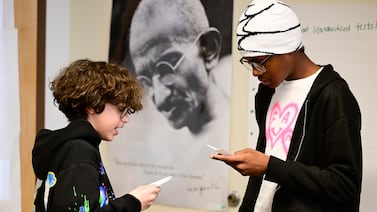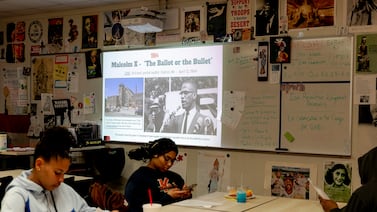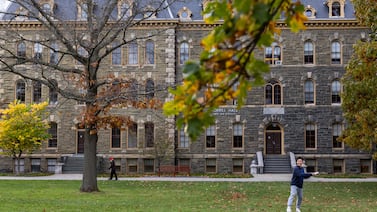Sign up for Chalkbeat’s free weekly newsletter to keep up with how education is changing across the U.S.
An influential conservative think tank has laid out a strategy to challenge a landmark Supreme Court decision that protects the right of undocumented children to attend public school.
The Heritage Foundation, which is spending tens of millions of dollars to craft a policy playbook for a second Trump presidential term, recently released a brief calling on states to require public schools to charge unaccompanied migrant children and children with undocumented parents tuition to enroll.
Such a move “would draw a lawsuit from the Left,” the brief states, “which would likely lead the Supreme Court to reconsider its ill-considered Plyler v. Doe decision” — referring to the 1982 ruling that held it was unconstitutional to deny children a public education based on their immigration status.
Plyler has survived challenges for more than 40 years. But some legal experts and advocates for immigrant children say the newest proposal to undermine it should be taken seriously, given Trump’s extreme anti-immigrant rhetoric, a steady drumbeat of headlines about the “migrant crisis,” and the conservative-led Supreme Court’s recent willingness to overturn established legal precedent.
“The politics right now of illegal immigration and the picture that conservatives, and even some liberals, have painted of stressing the resources of states and localities, I think that that’s a huge factor,” said Brett Geier, a professor at Western Michigan University who wrote a book about K-12 schools and the Supreme Court. “I do think that this court has the chutzpah to say: We’re going to take it on and overturn it.”
But others say the real intent is to rile up voters in an election year, and that Plyler v. Doe isn’t truly at risk.
“Every time there’s an election, all of a sudden immigration becomes a big problem, and [we hear]: ‘We have to do something about these immigrants, and get rid of them, and not pay for their schooling,’” said Patricia Gándara, a research professor at UCLA’s Graduate School of Education who’s written extensively about how immigration enforcement affects children and schools. “Then after the election is over, it dies away.”
Charging school tuition in Texas led to Plyler ruling
A growing share of Americans, and Republicans in particular, say immigration policy is a top concern right now. And immigration issues are getting a lot of attention in this year’s presidential race.
Trump has campaigned on a series of hardline, restrictive immigration policies, including the mass deportation of undocumented immigrants and the end of refugee resettlement. He’s also falsely claimed that migrant children have displaced other kids in New York City’s public schools.
The focus on immigration comes as the country is seeing a significant increase in migrants arriving at the U.S.-Mexico border. Federal officials counted nearly 2.5 million people who reached the southern border last year. That was a 43% increase from two years earlier, though not all were admitted. A rising share are families with children.
More than three-quarters of Americans view what’s happening at the border as a major problem or a crisis, a recent poll by the Pew Research Center found. Just under a quarter of U.S. adults said they were concerned that the rise in migrants would be an economic burden on the country.
The Heritage Foundation taps into those concerns with its recent brief, titled “The Consequences of Unchecked Illegal Immigration on America’s Public Schools.” In it, the organization criticizes President Biden’s approach to immigration policy, saying it’s led to “large influxes of non-English-speaking children” enrolling in public schools.
The document cites examples of Texas schools holding lessons in hallways, and a Brooklyn high school that had students learn virtually for a day after the school housed migrant families overnight during a rainstorm.
In response, the Heritage Foundation is calling on states to prohibit schools from housing undocumented immigrants and to require schools to collect student enrollment data by immigration status “so that accurate cost analyses can be done.” States should require school districts to charge undocumented children tuition to attend public school, the brief states.
It was this exact practice nearly half a century ago — in the same state that’s defying the federal government by handling its own immigration enforcement — that led to the Plyler v. Doe ruling.
Texas passed a law in 1975 saying that public schools would not receive state funding for the education of undocumented children and that districts could bar these students from attending public school for free.
Two years later, the Tyler Independent School District started charging undocumented children $1,000 a year to attend school — a sum district officials knew would be unaffordable for the area’s immigrant families, who often worked in Tyler’s famous rose industry, along with meat-packing plants and farms.
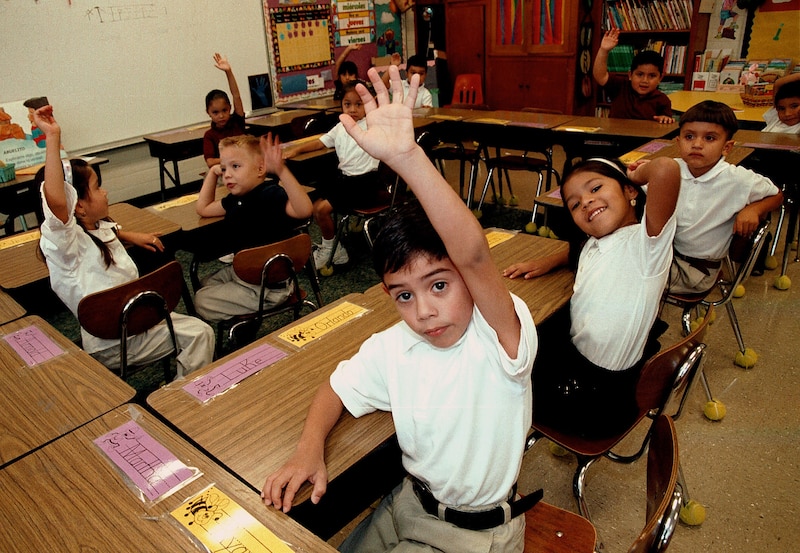
“I don’t think any family could have paid that,” James Plyler, the district’s superintendent, told an Education Week reporter in 2007. “One thousand dollars back in 1977 was lots and lots of money, and most of those families who came in were working for minimum wage.”
Four families whose children were blocked from attending school sued Plyler and the school district, and eventually won at the Supreme Court. In the 5-4 opinion for the majority, Justice William Brennan wrote that denying undocumented children the ability to learn how to read and write would take an “inestimable toll” on their “social, economic, intellectual, and psychological well-being.” (The dissenting justices agreed it was wrong to deny undocumented kids an education, but argued it wasn’t a constitutional violation.)
Now, the Heritage Foundation says those education costs have grown too high, and states and schools should be able to recoup them. The federal government could help, said Madison Marino, a senior research associate who co-authored the Heritage Foundation brief, or parents or sponsors of undocumented students could pay.
“We really aren’t looking to deprive these kids of their education,” Marino said. “We’re calling for everyone to contribute.”
Most undocumented families today would likely struggle to pay school tuition, as they did in 1977. And federal aid seems unlikely. Congress is bitterly divided over how to fund immigration policy and whether schools need more funding in the wake of the pandemic, and the U.S. Department of Education has historically devoted a tiny fraction of its budget to educating English learners and immigrant students.
The Trump campaign did not respond to a request for comment about the Heritage Foundation’s proposals to challenge Plyler, but observers widely believe the think tank would play a crucial role in a second Trump administration. Elsewhere, the campaign has said that external groups do not speak for Trump or his campaign, and that policy recommendations are just that.
Migrants bused to cities spur calls for federal help
Who bears the financial responsibility for educating undocumented children has been a heated topic of debate, especially over the last two years.
In May 2022, Texas Gov. Greg Abbott said he wanted to challenge Plyler v. Doe “because the expenses are extraordinary and the times are different” than in 1982. He called on the federal government to cover the educational costs for undocumented students.
Since then, Abbott has bused more than 75,000 migrants to six cities led by Democrats that have certain “sanctuary” policies protecting immigrants.
Newcomer students can bring many assets, from linguistic diversity to knowledge about life elsewhere in the world, educators say, and some schools have successfully adapted to meet newcomers’ needs.
But many schools have struggled to do so. Newcomer students often do not speak English and sometimes have missed months or even years of schooling. Many experienced trauma on their journey to the U.S. or in their home country that can affect their schooling. Schools often lack bilingual teachers and mental health staff to help. And when lots of students arrive in the middle of the year, state funding doesn’t always follow right away, leaving schools to make do with the resources they have.
Many educators and local officials have called on their states and the federal government to provide additional funding to help — with limited success. Extra money for migrant students was left out of the Illinois governor’s budget proposal, and extra funding allotted in Colorado breaks down to less than half of what the state would typically spend per student.
Plyler challenge could hinge on cost questions
Challenging Plyler would be difficult, said Thomas A. Saenz, the president and general counsel at the Mexican American Legal Defense and Educational Fund, which represented the families in the original Plyler case. The ruling is now tied up with other federal law, as well as privacy protections for K-12 students.
“It’s not like: ‘Oh, let’s just tee up Plyler, and pass a law, and immediately this more conservative Supreme Court will overturn the ‘82 decision,’” he said. “That analysis is way too facile.”
But there are ways Plyler could be vulnerable, said Amanda Warner, a doctoral candidate at George Mason University who analyzed past challenges to the ruling. The current Supreme Court has favored states’ rights and an originalist reading of the constitution. And in 1973, the Supreme Court held that there is no constitutional right to an education.
That is a “glaring hole” that could be exploited, Warner said.
Another avenue to challenge the ruling could center on educational conditions and costs, and whether those have changed enough to warrant denying undocumented children a free public education.
Back in 1982, Texas argued it needed to do that to preserve resources for educating its “lawful residents.” But the Supreme Court rejected that argument. Brennan wrote that undocumented students did not impose “special burdens” on Texas’ education system, and that excluding them from school would be unlikely to improve the overall quality of education.
The Heritage Foundation brief says that unauthorized immigration, particularly among children arriving without their parents, has reached a point where a “reconsideration is warranted.”
The original ruling seems to imply “there is a bar” for a state to show that educating undocumented students is too much of a financial burden, Warner said. But it wouldn’t be enough to simply show the cost of education is higher.
Any money saved by excluding undocumented children from school would have to be weighed against the ripple effects on housing, social services, and the criminal justice system. “Costs can be borne in a lot of ways,” Warner said. “What are the costs of having all these uneducated persons in the United States?”
Whether a serious challenge will emerge remains to be seen. Marino said no state official has reached out about making the Heritage Foundation’s proposal a reality.
After Abbott raised the possibility of challenging Plyler two years ago, a Texas lawmaker introduced a bill that would have denied undocumented students a free public education, unless the federal government paid for it. But unlike in 1975, the proposal didn’t go anywhere.
Nicholas Espíritu, the deputy legal director for the National Immigration Law Center, said if such a proposal couldn’t advance in Texas, that should deter other states from trying.
“It’s our hope that even though there might be some rumblings from the Heritage Foundation and states like Texas,” he said, “that eventually politicians will come to the same conclusion and realize that this is not a position that is ultimately supported.”
Kalyn Belsha is a senior national education reporter based in Chicago. Contact her at kbelsha@chalkbeat.org.


